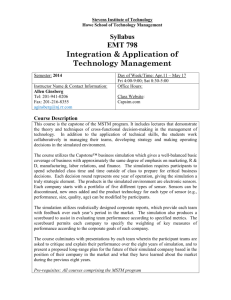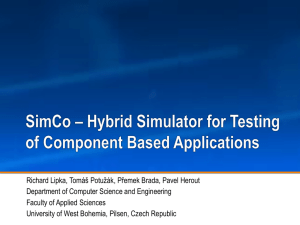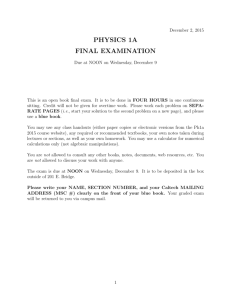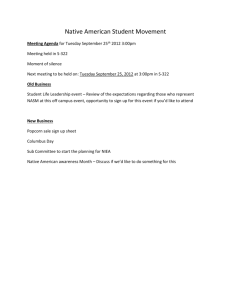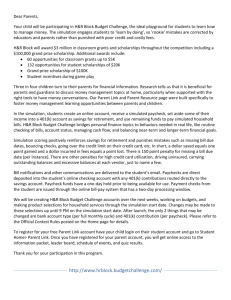Syllabus - Stevens Institute of Technology
advertisement
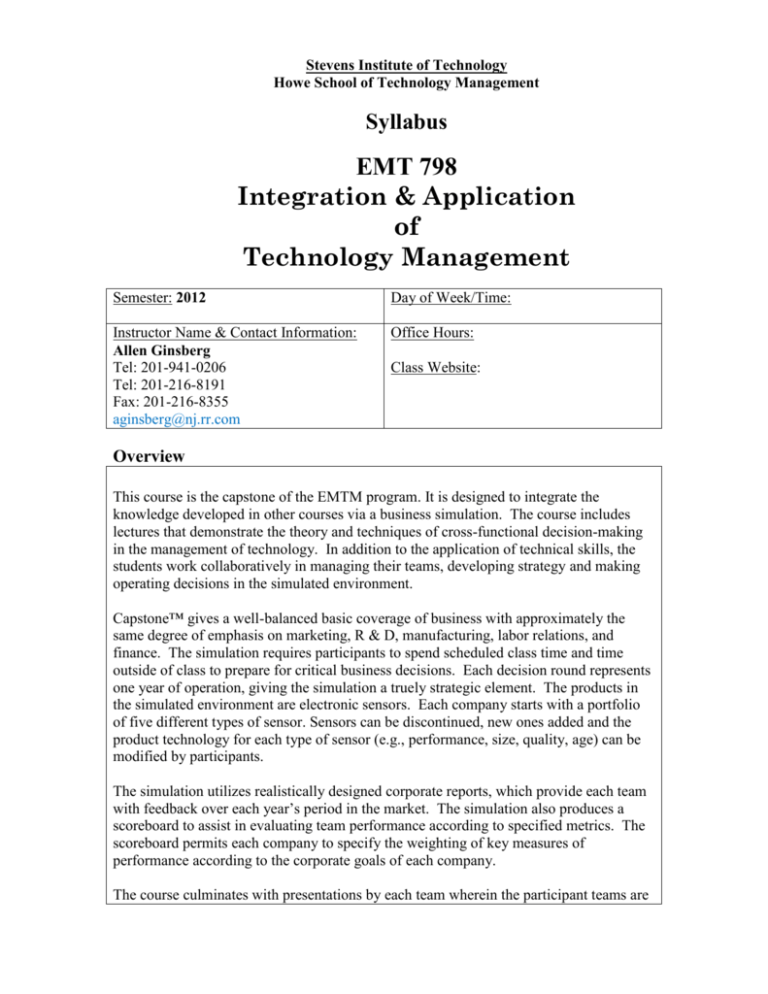
Stevens Institute of Technology Howe School of Technology Management Syllabus EMT 798 Integration & Application of Technology Management Semester: 2012 Day of Week/Time: Instructor Name & Contact Information: Allen Ginsberg Tel: 201-941-0206 Tel: 201-216-8191 Fax: 201-216-8355 aginsberg@nj.rr.com Office Hours: Class Website: Overview This course is the capstone of the EMTM program. It is designed to integrate the knowledge developed in other courses via a business simulation. The course includes lectures that demonstrate the theory and techniques of cross-functional decision-making in the management of technology. In addition to the application of technical skills, the students work collaboratively in managing their teams, developing strategy and making operating decisions in the simulated environment. Capstone™ gives a well-balanced basic coverage of business with approximately the same degree of emphasis on marketing, R & D, manufacturing, labor relations, and finance. The simulation requires participants to spend scheduled class time and time outside of class to prepare for critical business decisions. Each decision round represents one year of operation, giving the simulation a truely strategic element. The products in the simulated environment are electronic sensors. Each company starts with a portfolio of five different types of sensor. Sensors can be discontinued, new ones added and the product technology for each type of sensor (e.g., performance, size, quality, age) can be modified by participants. The simulation utilizes realistically designed corporate reports, which provide each team with feedback over each year’s period in the market. The simulation also produces a scoreboard to assist in evaluating team performance according to specified metrics. The scoreboard permits each company to specify the weighting of key measures of performance according to the corporate goals of each company. The course culminates with presentations by each team wherein the participant teams are asked to critique and explain their performance over the eight years of simulation, and to present a proposed long-range plan for the future of their simulated company based in the position of their company in the market and what they have learned about the market during the previous eight years. Prerequisites All of the courses comprising the EMTM program Learning Goals After taking this course, the student will be able to: 1. Formulate an effective strategy for a complicated high technology business in a highly competitive environment. 2. Implement a strategic plan by making sound tactical decisions in all functional areas of the simulated company using financial and operating results data. 3. Perform effectively in a multi-functional management team. 4. Prepare a realistic business plan for a company based on current condition, past performance and the existing competitive situation. 5. Critically analyze the company performance and adapt strategy and tactics to conform to that analysis. 6. Prepare and present to a company board of directors a professional presentation of past business results and future plans. Pedagogy The course consists principally of team decision making in simulated business competition against other teams in the class. In the first four years of operation, each team is given a strategy by the instructor and is encouraged to implement that strategy in the most effective way. The bulk of the course consists of eight years of competition where each team chooses its own strategy and tactical plan. Each team prepares its mission statement, goals and objectives and chooses the weighted combination of metrics by which they wish the performance of their business to be judged. At the completion of each year, all teams are provided with detailed results which are thoroughly debriefed by the instructor. Student participation is encouraged, and coaching by the instructors is carried out as necessary. Strong emphasis is placed on integration of the multi-functional aspects of the decision making. Towards the end of the course, students complete four years of Comp-XM®, in which each student competes independently against three computer “teams,” and then answers a set of queries custom designed for each round and each student, allowing an assessment of individual performance. Important: Each student will need a laptop computer configured to access the wireless network at Stevens for this exercise. At the conclusion of the eight-year simulation, each team prepares a written report critiquing the company’s performance and presents this to a Board of faculty members 2 representing the Board of Directors of the simulated company. The team also presents their strategic plan for the next five years of operations (if the company were to continued to be managed by the team). Both of these issues are to be based on actual eight years results and the operational and financial position at the end of the eight years. Selected topics not simulated in the Capstone, such as transfer pricing in global companies, are covered in lectures and discussions. Required Text(s) Capstone®Team Member Guide – An updated 2012 version Comp-XM® – Examination Guide 2012 (Both available for viewing and/or downloading at Capsim.com Web site to all participants). Assignments Each team is required to submit: A mission statement, objectives and goals and tactical plan for both the four year and eight year simulations. A Team Charter detailing the imperatives for the functioning of their team (e.g., rules, roles, meeting conduct, etc.). A written, detailed report and critique of their performance over the eight years including mistakes made and lessons learned. A summary of their final Board of Directors presentation. Course Grading Item Team Behavior & Development via participation in Planning and Feedback Grade Percent 10% Company Business Results (8-year simulation) 30% Individual Results on Comp-XM 30% Demonstration of course learning elements via Strategic Plans, Team Charter and Board of Director Presentation 30% 3 Total Grade 100% Ethical Conduct The following statement is printed in the Stevens Graduate Catalog and applies to all students taking Stevens courses, on and off campus. “Cheating during in-class tests or take-home examinations or homework is, of course, illegal and immoral. A Graduate Academic Evaluation Board exists to investigate academic improprieties, conduct hearings, and determine any necessary actions. The term ‘academic impropriety’ is meant to include, but is not limited to, cheating on homework, during in-class or take home examinations and plagiarism.“ Consequences of academic impropriety are severe, ranging from receiving an “F” in a course, to a warning from the Dean of the Graduate School, which becomes a part of the permanent student record, to expulsion. Reference: The Graduate Student Handbook, Academic Year 2003-2004 Stevens Institute of Technology, page 10. Consistent with the above statements, all homework exercises, tests and exams that aredesignated as individual assignments MUST contain the following signed statement before they can be accepted for grading. ____________________________________________________________________ I pledge on my honor that I have not given or received any unauthorized assistance on this assignment/examination. I further pledge that I have not copied any material from a book, article, the Internet or any other source except where I have expressly cited the source. Signature ________________ Date: _____________ Please note that assignments in this class may be submitted to www.turnitin.com, a webbased anti-plagiarism system, for an evaluation of their originality. 4 Course Schedule Session # Dates #1 April 20 Friday (4:00 – 9:00) #2 April 21 Saturday (8:30-5:00) Week of April 23 - 27 #3 April 27 Friday [Virtual] #4 April 28 Saturday (8:30-5:00) Week of April 30 – May 4 #5 May 4 Friday Virtual] #6 May 5 Saturday (8:30-5:00) Content Course intro, objectives and conduct Review Capstone® & Financial Statements Introduce Labor Negotiations Dinner Team organization/behavior/decision processes/charter/Peer Feedback [P. Dominick] Live Demo and Q & A Team deliberations – Year 1P (Practice)--------------------------------------------Submit Year 1P-----------------------------------------------------------------------------Debrief Year 1P results ------------------------------------------------------------------Lunch-----------------------------------------------------------------------------------------Team deliberations – Year 2P Submit Year 2P-----------------------------------------------------------------------------Debrief Year 2P Begin working on Team Organization and Charter - due Friday, April 27 to P. Dominick by e-mail Continue working on Team Organization and Charter Work on developing Mission/Strategy and Success Measures for the 8-yr simulation Team deliberations - Year 1. Decisions due by Fri. April 27 by 9pm Submit Year 1 – by 9pm----------------------------------------------------------------Submit Team Organization and Charter [E-mail to P.Dominick]. Submit Mission/Strategy [E-mail to AG]. Debrief Year 1----------------------------------------------------------------------------Team deliberations - Year 2. Submit Year 2. -----------------------------------------------------------------------------Lunch Debrief Year 2 results.--------------------------------------------------------------------Team deliberations -Year 3. Submit Year 3. -----------------------------------------------------------------------------Debrief Year 3 results.--------------------------------------------------------------------Team deliberations -Year 4. Decisions due Friday May 4by Noon. Submit Year 4 – by Noon.----------------------------------------------------------------Debrief Year 4 results – via Wimba.-------------------------------------------------------------Start Year 5 (Decisions due by Sat. May 5 by 10:30) Submit Year 5.------------------------------------------------------------------------------Debrief Year 5 results.--------------------------------------------------------------------Team deliberations - Year 6. Lunch Submit Year 6. -----------------------------------------------------------------------------Debrief Year 6 results.--------------------------------------------------------------------- Time 4.00pm 6.00pm 7:00pm 8;30am 11:00am 11:15am 12:00pm 4:00pm 9.00pm 8.30am Noon 1.00pm 4:15pm 4:30pm Noon 6:00pm 10:30am 10:45am Noon 4:15pm 4:30pm 5 Week of May 7-11 #7 May 11 Friday [Virtual] #8 May 12 Saturday (8:30-5:00) Week of May 14-18 #9 May 19 Saturday (9:00-5:00) Team deliberations – Year 7. Submit Year 7 by Noon, Friday May 11 Read Comp-XM® Outline Board Presentation Submit Year 7 – by Noon.----------------------------------------------------------------Debrief Year 7 results via Wimba.--------------------------------------------------------Submit Year 8-------------------------------------------------------------------------------Debrief Year 8 results.---------------------------------------------------------------------Intro to Comp XM----------------------------------------------------------------------------Do Year 1 Comp-XM® and Year 2 Comp-XM® [BRING LAPTOP!] ----------Lunch Course/Instructor Evaluation Noon 6:30pm 10:30pm 8:30am 9:00am 10:00am Noon Do Year 3 Comp-XM® and Year 4 Comp-XM® and final Board Query Prepare Board presentations Final date to submit Peer Feedback – May 18 Board Presentations (8 teams @ 25minutes each + Q&A). ------------------ 9:00am Lunch, Class Picture & Exit Survey 6
